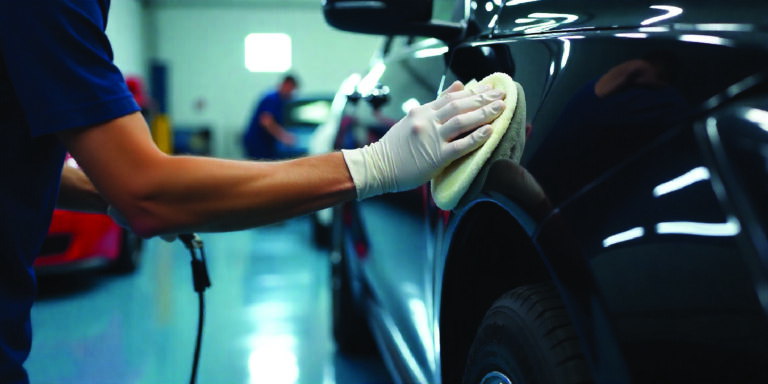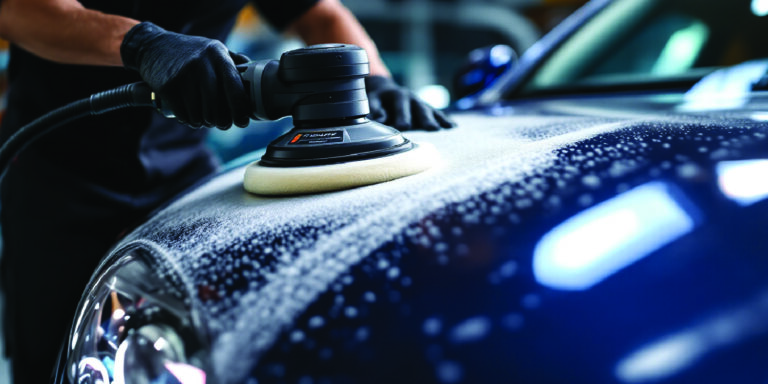When most people think of car detailing, they imagine a shiny vehicle that looks fresh off the showroom floor. But in reality, car detail shops do much more than make your car look shiny and clean. It protects your vehicle’s paint, interior materials and increases the overall resale value. Everyday driving exposes your car to damage that regular washes cannot fully address.
So, how often should you visit a car detail shop? The answer depends on many factors. Your driving habits, environment, and how you store your car all play a role in planning your detailing schedule. Someone commuting daily through city traffic will need detailing more often than someone who drives only on the weekends.
This blog is designed to help you create a personalized detailing schedule based on how, where, and how often you drive. Whether you use your car every day or only take your car out on special occasions, your car needs regular detailing. Let’s break down how your habits influence how often you should visit car detail shops.
What is Car Detailing and Why Does It Matter?
Car detail shops are not just about a thorough clean-up. It involves the restoration and finishing of a vehicle to produce a professional level of cleanliness and polish. Interior detailing focuses on deep-cleaning the inside of a vehicle. Cleaning seats and upholstery, wiping down dashboards, applying protectants to surfaces, and vacuuming and shampooing carpets are all included in this. Air vents are also frequently cleaned to get rid of dust and odours, and leather seats are conditioned.
Cleaning and restoring the car’s external surfaces is known as exterior car detailing. Cleaning windows, mirrors, wheels, and tires is the basics. But detailing also entails washing, claying, polishing, and waxing the paint. Detailing also removes swirl marks and scratches, and even cleans the engine bay.
How is auto car detailing different from a regular car wash? A car wash is a quick surface clean. It is mostly a rinse, a soap wash, and a dry. While it helps remove dirt and grime, it doesn’t accomplish the level of cleaning or protection of detailing. Full detailing at car detail shops is comprehensive. It restores and protects all parts of the vehicle- inside and out. Detailing takes time and care, often using specialized products and tools to clean, polish, and preserve the car.
Regular detailing protects paint and upholstery, preserves resale value, and enhances the driving experience.
Common Driving Habits That Influence Detailing Frequency
Daily Commuters
Daily commuters are often city drivers. City commute exposes your vehicle to high pollution, road salt, and construction dust. The dust and grime build-up will be higher. The recommended frequency is every 1-2 months.
Highway Drivers
These drivers are long-distance drivers. The challenges in this scenario are bug splatter, tar buildup, and windshield grime. The recommended frequency of auto detailing is every 2-3 months.
Weekend or Occasional Drivers
In this case, exposure to the elements is less frequent. The recommended frequency of visits to car detail shops is every 4-6 months.
Off-Road or Rural Area Drivers
Off-road drives are usually done in rough terrain. The car is exposed mud, gravel, and dirt while driving in rural areas. It is recommended to do a monthly auto detailing or after off-road trips.
Garage-Kept, Rarely Driven Vehicles
Collectors use their prized possessions less often and keep them well protected from the elements. The interior experiences less wear. These types of drivers need to auto-detail their vehicles once every 6 months for upkeep.
Seasonal Considerations
Winter
In the winter season, the main threat is road salt, which is used to melt ice and snow on roads. Salt improves driving safety, but it is damaging to your car’s exterior and undercarriage. Salt is highly corrosive and can cause rust if left on the car. That’s why frequent detailing at car detail shops during winter is essential. Applying a high-quality wax or sealant during winter can help protect the exterior of the car. It also helps prevent salt from sticking to the paint.
Interior detailing is also important during winter. Snow, mud, and road salt can be carried inside, damaging carpets and upholstery. Regular cleaning and use of protective mats help preserve the vehicle’s interior.
Winter detailing at car detail shops is about preventing long-term damage. Detailing regularly in the cold months can stop rust before it starts. This will extend the life of your vehicle and maintain its appearance.
Spring
After an extensive winter, your car will accumulate a lot of grime, road salt, and debris that can damage both the exterior and interior. Spring is the time for an all-out clean-up of the exterior and interior.
The exterior has to be detailed well. The dirt, grime, and road salt have to be eliminated to preserve the paint and finish.
Dust, dirt, and allergens that have accumulated in the interiors must also be tackled. Pollen is on the rise in spring, and washing the interior of your car will reduce it. The air vents, upholstery, carpets, and cabin air filters have to be cleaned. Detailing should include applying a protective coating. A new layer of wax/sealant may be necessary after a brutal winter season. Applying a fresh coat of polymer, wax, or sealant guards your paint from these harsh elements.
Summer
During summer, your vehicle is exposed to intense elements, like UV rays, high temperatures, and increased sunlight. All factors that can cause wear and damage over time. Regular detailing from car detail shops is essential to protect your car from damage. Prolonged exposure to UV rays can fade the paint and dull its shine. Auto detailing places apply high-quality wax or paint sealant to prevent this.
Sunlight and heat damage the interior of the car as well. It causes dashboard materials, leather, and plastics to crack or fade. Summer detailing is about protecting your car from the sun’s destructive effects.
Fall
In fall, falling leaves, tree sap, and increased moisture can damage your car’s paint. When moist leaves fall, they stick to the surface releasing tannins and other organic acids. These substances can stain the clear coat. Tree sap is another fall hazard. It can cause discoloration and surface damage.
Fall detailing includes thorough washing and decontaminating the exterior to remove leaves, sap, and pollen.
Benefits of Visiting Car Detail Shops Near You
Car detail shops use professional-grade tools and premium products for cleaning and expert restoration that go far beyond what standard at-home methods can achieve.
Car detail shops are the experts in protecting modern finishes. Newer vehicles often feature delicate clear coats and specialty paints. Paints that have advanced materials like carbon fibre or soft-touch plastics. These surfaces require the expertise of a reputable car detail shop to protect them.
Another benefit is time-saving. Detailing can take several hours or even a full day. For busy people, hiring a professional means getting showroom-level results while saving time.
Lastly, car detail shops often offer add-on options. These may include ceramic coatings, engine bay cleaning, or headlight restoration.
Overall, professional detailing is a smart investment in your vehicle’s appearance and longevity.
The Last Detail
Just like you visit your doctor for regular checkups to stay healthy, your car needs the same kind of care. Taking it to local car detail shops regularly helps keep it looking great and running smoothly.
How often you should visit a car detail shop depends on several factors. Factors like how and where you drive, the colour of your car, and how much exposure it has to sun, rain, snow, or pollution. All these elements affect how quickly your car’s exterior and interior wear down, so your detailing schedule should match your vehicle’s specific needs.
Regular maintenance of your vehicle at car detail shops increases your car’s longevity and value.
Visit a trusted Colibri Car Styling in Toronto for a consultation or quote.





